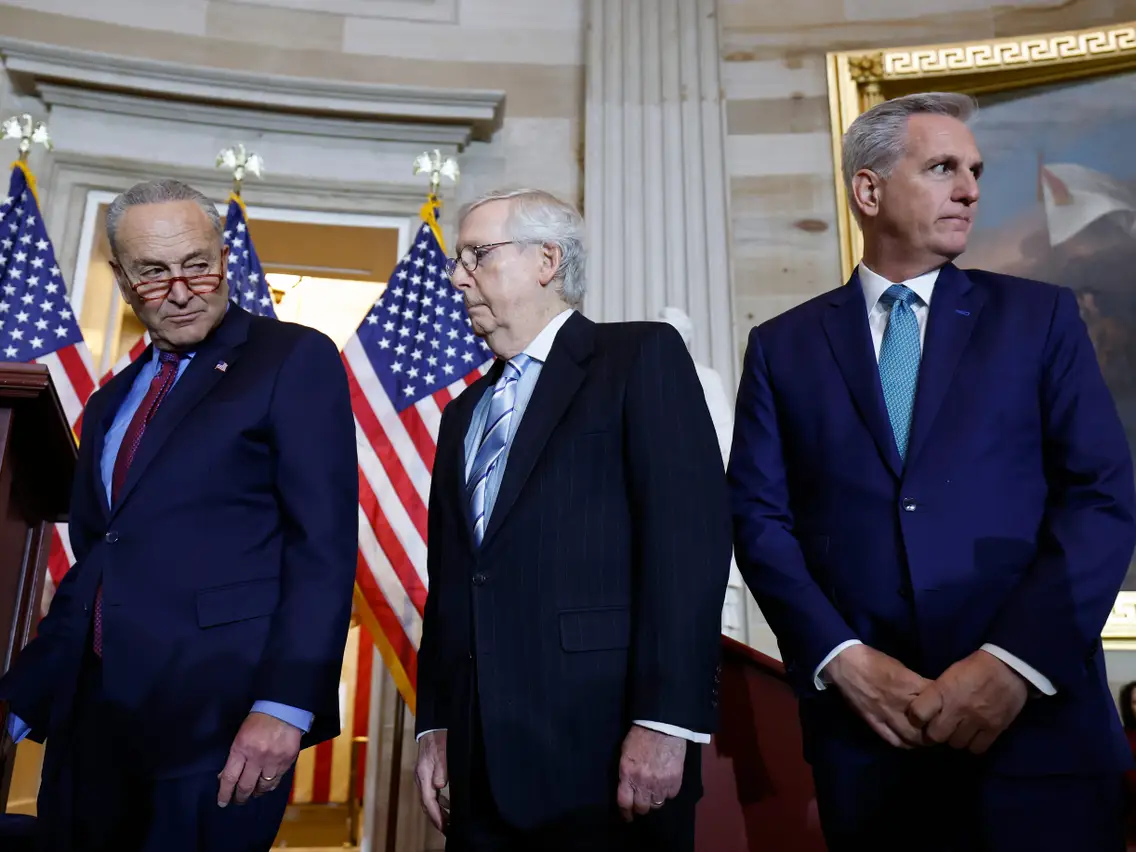
Deniz ÜNVER
Independent Researcher
The Debt Ceiling issue, which means the maximum amount of money the US government can borrow by issuing bonds to pay for federal employees, the military and social security in the US, has once again turned into a crisis. However, following the vote in the house of representatives, on May 31, 2023, the US Senate approved the Debt Ceiling, with 63 favoring and 36 opposing votes.[1]. The timing of this law was critical since it was only days before the US government was about to start to run out of money and make a default.
The agreement raised the borrowing limit of the US until 2025, putting more restrictions on the US fiscal policy.[2] In the interval, President Joe Biden and Congress can set aside the politically risky issue until after the 2024 elections in the US[3]. Thus, it is assumed that during this extra time, government spending can be decreased, the speed of the permitting process for energy projects can be increased, and the unused COVID-19 fund can be taken back[4].
However, there was strong opposition to the approval of the Debt Ceiling in the Congress. The Republicans, who consider the rising government debt as evidence of uncontrolled spending, have considered the Debt Ceiling Law with a certain skepticism[5]. Many Republicans opposed the Debt Ceiling. As stated by John Barrasso, the Republican Senator from Wyoming, “This is a missed opportunity to get government under control and put our nation on a sustainable fiscal path. If we are serious about tackling the debt and beating back inflation, much more needs to be done[6].” Prior to the approval of the Debt Ceiling, Republicans had argued that more spending cuts were necessary to prevent the growth of the national debt, which is worth 31.4 trillion dollars, and this is approximately equal to the annual output of the US economy[7].
The approval of the Debt Ceiling from the Senate has created relief for the US economy, at least for a while. Indeed, the comments on this decision were not delayed. According to Chuck Schumer, the Democratic Senate Majority Leader, “It is suitable for this country that both parties have come together at last to avoid Default.[8].” He concluded that “America can breathe a sigh of relief[9].” Also, Suzanne Clark, the Chief Executive of the US Chamber of Commerce, stated, “The President and the Congress averted a catastrophe while also laying the groundwork for more responsible fiscal policy moving forward[10].” Moreover, President Biden had stated after the vote in the House of Representatives that, “This agreement is good news for the American people and the American economy. I urge the Senate to pass it as quickly as possible so that I can sign it into law[11].”
The US economy was saved from real trouble, as understood from the comments. The possibility of not reaching a consensus on the Debt Ceiling would have had unfavorable consequences. First of all, if Republicans and Democrats had not agreed on the Debt Ceiling in Congress, that would have meant that the US would default on its 31.4 trillion dollars debt[12]. Then, the US government would not be able to borrow more, and it would quickly run out of funds and be unable to finance the salaries of federal and military employees and as well as other obligations.[13]. In addition to this, according to the estimations of the White House Council of Economic Advisors, the result of not agreeing on the Debt Ceiling would have shrunk the US economy by approximately 6.1%[14]. Furthermore, economist Mohammed el Erian, the president of the Queens College at Cambridge University, expressed that this default could create a recession for the US economy[15]. Thus, this default would have not only hurt the trade levels but also could have caused more unemployment. Another consequence of this would be increasing mortgage levels in other countries[16]. The default makes borrowing costlier for governments. Finally, the rising cost of living would have stood as another result of the disagreements between the Republicans and Democrats in the Congress.
Nevertheless, the Debt Ceiling does not mean that the US and global economies were saved. The Fitch Ratings announced it decided to keep the US on watch for a potential credit rating downgrade[17]. It stated; “Fitch believes that repeated political standoffs around the debt limit and last-minute suspensions before a certain date lowers confidence in governance on fiscal and debt matters.[18]” Besides, it was expressed by Fitch that because of debt ceiling problems a steady deterioration in governance over the last 15 years has taken place in the US[19]. The views of the Fitch Ratings clearly show that the Debt Ceiling Drama is apt to create a trust issue always for the US economy.
In general, it must be underlined that the Debt Ceiling crisis is just another indicator that the US and world economies have been deteriorating. It reveals the fact that the USA makes use of the Bretton Woods system and the supremacy of the dollar to pay its debts printing more paper money, in other words, abusing the system by flooding the world economy with more dollars. Even though the decision of Congress prevented the negative consequences of the default once more, the Debt Ceiling Drama is always a threat for the US economy, and the approval of the Debt Ceiling is no more than a just a temporary solution. The debt issue of the US is a threat to the global economy as well because of the size and potential of the US economy.
*Photograph: https://www.businessinsider.com/when-will-us-reach-debt-ceiling-deadline-congress-negotiating-default-2023-3
[1] James Politi, ¨US Senate Passes Bill to End Debt Ceiling Stand Off and Avoid Default ¨, Financial Times, June 2, 2023, https://www.ft.com/content/6263e3eb-e831-4042-bd50-50c78a2f991e
[2] Ibid.
[3] Ibid.
[4] Ibid.
[5] Natalie Sherman, “US Debt Ceiling-What is it and Why there is one?”, BBC, June 2, 2023, https://www.bbc.com/news/business-65461927
[6] James Politi, ¨US Senate Passes Bill to End Debt Ceiling Stand Off and Avoid Default ¨, Financial Times.
[7] David Morgan, Richard Cowan and Moira Warburton, ¨US Debt Ceiling Bill Passes House with Bipartisan Support¨, Reuters, June 1, 2023, https://www.reuters.com/world/us/us-debt-ceiling-bill-faces-narrow-path-passage-house-2023-05-31/
[8] James Politi, ¨US Senate Passes Bill to End Debt Ceiling Stand Off and Avoid Default ¨, Financial Times.
[9] Ibid.
[10] James Politi, ¨US Senate Passes Bill to End Debt Ceiling Stand Off and Avoid Default ¨, Financial Times.
[11] David Morgan, Richard Cowan and Moira Warburton, ¨US Debt Ceiling Bill Passes House with Bipartisan Support¨, Reuters.
[12] Dearbail Jordan, ¨Could A US Debt Default Unleash Global Chaos?¨,BBC, May 19, 2023, http://https://www.bbc.com/news/business-65633280
[13] Ibid.
[14] Ibid.
[15] Ibid.
[16] Ibid.
[17] Matt Egan, ¨Fitch Warns It Could Still Downgrade America’s Credit Rating Despite Debt Ceiling Resolution¨, CNN, June 2, 2023, https://edition.cnn.com/2023/06/02/economy/fitch-credit-downgrade-warning/index.html
[18] Ibid.
[19] Ibid.
© 2009-2025 Avrasya İncelemeleri Merkezi (AVİM) Tüm Hakları Saklıdır
Henüz Yorum Yapılmamış.
-
 ISLAMOPHOBIA: CHINA VERSUS US - 31.03.2023
ISLAMOPHOBIA: CHINA VERSUS US - 31.03.2023
Deniz ÜNVER 31.03.2023 -
 G20 ZİRVESİ VE İLETTİĞİ MESAJ - 30.11.2022
G20 ZİRVESİ VE İLETTİĞİ MESAJ - 30.11.2022
Deniz ÜNVER 30.11.2022 -
 HUMAN RIGHTS VIOLATIONS OF THE REFUGEES: THE CASE OF FRONTEX AND THE EU - 14.09.2021
HUMAN RIGHTS VIOLATIONS OF THE REFUGEES: THE CASE OF FRONTEX AND THE EU - 14.09.2021
Deniz ÜNVER 14.09.2021 -
 ÇİN-TÜRKİYE İLİŞKİLERİNİN DAHA DETAYLI BİR İNCELEMESİ - 28.03.2022
ÇİN-TÜRKİYE İLİŞKİLERİNİN DAHA DETAYLI BİR İNCELEMESİ - 28.03.2022
Deniz ÜNVER 29.03.2022 -
 THE ENERGY CRISIS OF EUROPE AND THE TURKMEN GAS: A PROBLEM AND A SOLUTION? - 06.01.2023
THE ENERGY CRISIS OF EUROPE AND THE TURKMEN GAS: A PROBLEM AND A SOLUTION? - 06.01.2023
Deniz ÜNVER 06.01.2023
-
PUTİN’İN ÇİN’DEN BATIYA TEHDİTLERİ
Prof. Dr. Alaeddin YALÇINKAYA 01.06.2014 -
 ABD BAŞKAN YARDIMCISI VANCE’IN GÜNEY KAFKASYA ZİYARETİ: STRATEJİK ORTAKLIK VE BÖLGESEL BAĞLANTI HAMLELERİ - ANADOLU AJANSI - 12.02.2026
ABD BAŞKAN YARDIMCISI VANCE’IN GÜNEY KAFKASYA ZİYARETİ: STRATEJİK ORTAKLIK VE BÖLGESEL BAĞLANTI HAMLELERİ - ANADOLU AJANSI - 12.02.2026
Hazel ÇAĞAN ELBİR 12.02.2026 -
 KANADA’DA BULUNAN TOPLU ÇOCUK MEZARLARI - 01.07.2021
KANADA’DA BULUNAN TOPLU ÇOCUK MEZARLARI - 01.07.2021
Ömer ZEYTİNOĞLU 07.07.2021 -
TÜRKİYE-ERMENİSTAN: ÇÖZÜM BEKLEYEN KOMŞULUK
Oya EREN 21.12.2009 -
DOĞU ASYA’DA SAVAŞ DAVULLARI
Mehmet KANCI 30.09.2012


